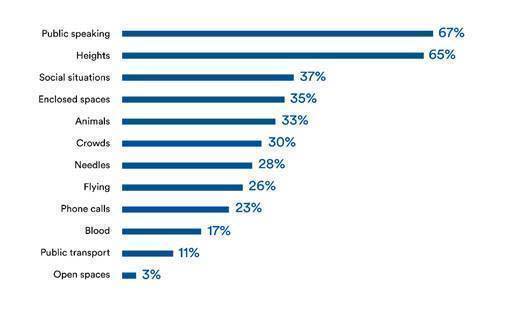Brits would rather miss out on their dream job than face their biggest fear

Brits are famous for their stiff upper lip, but the habit of putting on a brave face may be having a negative impact on their careers.
Two in five (39%) Brits admit they would reject their dream job if meant coming face to face with their biggest fear, In a according to a survey of 2,000 UK employees by YouGov for job board Jobsite.
Some 14% said their fears have already had a negative impact on their professional career.
But many are choosing to keep their fears to themselves, with only 2% having ever spoken to their HR teams about them and as little as 7% ever choosing to talk to their manager.

Brits were asked to rate 12 of the most common fears on a scale of being “very afraid” to “not at all.” Public speaking was at the top, beating both heights (65%) and social situations (37%) as the nation’s number one fear.
As many as 67% of Brits admitted to “shunning the centre stage,” revealing their fear of public speaking. Just under a quarter (23%) confessed to being “very afraid” of speaking up.
The results suggest presenting in front of their peers is a daunting challenge for most Brits, despite it being widely considered a necessary skill in the workplace by employers.
MORE: How to handle public speaking when you have anxiety
One survey respondent told pollsters he had suffered from a fear of public speaking since he was a child. He described himself as a sweaty, “gibbering wreck” with a “racing heart” in interview situations.
He said his fear had impacted on past career opportunities. ‘’I used to beat myself up that I couldn't sell myself well. So I missed a few opportunities,” he said.
He has worked hard to reduce the effects of his fears but admitted: ‘‘I have half-overcome my phobia... It’s still uncomfortable for me.”
READ MORE: How to speak up in a meeting when you have anxiety
Heights remain a towering fear for a number of UK employees, with 65% of respondents enduring some degree of acrophobia or “vertigo”, and many saying it affects them at work.
Another survey respondent, a former stage manager, said she used to have to face her fear of heights daily as part of her job.
“I have a horrible fear of heights. It affected work when I was a stage manager – there was a lot of ladder climbing and, worse still, climbing tallescopes,” she said.
“I shook so much my fingers could barely fashion a strong enough knot to hold the light. It was a whole-body shake – not confined to arms or legs. It was, basically, unsafe for me to do that part of the job.’’
READ MORE: The fool-proof public speaking tip that will make you sound like a pro
The research also reveals Brits’ changing relationship with technology is having an impact on their social and professional behaviour.
The under-35 generation of employees is now almost three times as likely (32%) as those over the age of 55 (12%) to fear a verbal phone conversation with a stranger.
This is a “serious issue” that “requires due thought and consideration in the workplace”, Jobsite warned.
It added: “Workplaces, where staff feel comfortable enough to express themselves and can work successfully towards overcoming their fears and phobias, have the potential to make a lasting positive impact on employee’s lives.’’
READ MORE: 5 tips for powerful public speaking, according to TED Talk

 Yahoo Finance
Yahoo Finance 